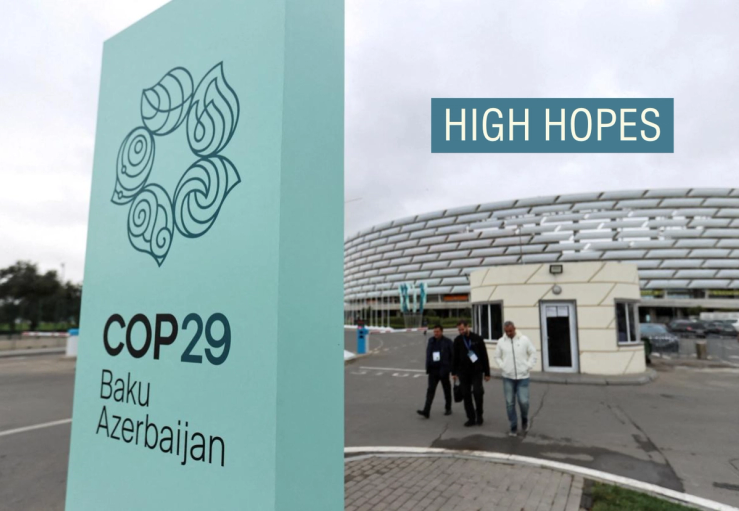The Scoop
This story has been updated to more accurately describe Alok Sharma’s outlook on COP29.
Developing country leaders and their allies in the activist community should temper expectations for a deal on climate finance at COP29 that hits the sky-high fundraising target many are hoping for, the UK official who led the 2021 iteration of the summit told Semafor.
The main goal for COP29 is to lay out a new strategy for wealthy governments, development banks, and private investors to drastically increase the amount of money they channel to poorer, climate-vulnerable countries for their clean energy and impact adaptation efforts. There are two facets of this strategy: A specific annual fundraising target to replace the $100 billion goal that countries have been chasing since 2009, and a plan for reaching it that will likely require expanding the pool of core donors beyond the US, Europe, Japan, and the World Bank. A growing number of activists, developing country politicians, and researchers have coalesced around $1 trillion as a target commensurate with countries’ real needs. “Anything far short of that will have to be seen as a failure,” David Nicholson, chief climate officer for the humanitarian group Mercy Corps, told Semafor.
They shouldn’t hold their breath, said Alok Sharma, a former British minister who served as president of COP26. While it’s still urgent and possible to make significant improvements to the climate finance status quo during COP29, he said, political agreement on a target “multiples” higher than $100 billion will be nearly impossible to get, and could even backfire by eroding the credibility of the COP process if it gets adopted but not followed through on.
“The new goal clearly has to be ambitious, but also has to be deliverable,” Sharma, now a member of the House of Lords, said.
In this article:
Tim’s view
Last year’s COP, in Dubai, was an experiment in taking the summit to an unprecedented scale, with nearly 100,000 people in attendance. The outcome was an agreement that, while it didn’t exactly solve the climate crisis, contained the strongest-ever global commitment to “transition away from” fossil fuels. The challenge this year in Baku will be to keep the momentum going with a much smaller and quieter meeting, and one happening against a lot of political and economic headwinds. The odds of success look steep.
The heads of state of the US, China, India, and France, among others, haven’t confirmed whether they will attend. For a meeting ostensibly focused on finance, many financial leaders will be missing, including the heads of most major banks and the head of the International Monetary Fund. The US delegation includes no senior officials from the Treasury Department. And the top diplomat from Papua New Guinea urged developing country leaders to boycott the meeting, calling it “a total waste of time.”
Meanwhile, evidence is mounting that the core goal of the Paris Agreement — limiting global warming to 1.5 C above pre-industrial levels — is now completely out of reach, and that a slower-than-expected energy transition has the world currently headed for twice that level of warming. The Baku meeting will start less than a week after the US presidential election. A Donald Trump win would augur at least four years ahead with the world’s top historic carbon emitter checking out of global climate negotiations.
Mukhtar Babayev, Azerbaijan’s former ecology minister, has the unenviable task of steering the summit. His country has been assailed by climate and human rights groups, and by numerous Western politicians, for the arrests of political opposition leaders and activists, and the persecution of ethnic Armenians during the country’s prolonged territorial conflict with Armenia. Azerbaijan is also a major oil and gas producer, and remains one of Europe’s top gas suppliers, which has also spurred criticism of its ability to lead decarbonization negotiations.
I don’t think it’s disqualifying for a COP host to have a robust fossil fuel industry: The United Arab Emirates, whose oil and gas production dwarfs Azerbaijan’s, was successful at COP28 precisely because it could speak credibly to peer fossil exporters. Baku may also be well-positioned to mediate between developed and developing countries on finance issues. And as Egypt learned when it hosted COP27, being in the global COP spotlight ramps up pressure to walk back political repression and to adopt stronger domestic climate policies. Last week, a top Azeri diplomat deflected criticism of his country as a “hypocrite’s game” and framed the summit as a chance to initiate more extensive peace talks with Armenia.
Still, managing a COP is a mighty diplomatic task, and early feedback on Babayev’s leadership leaves open the question of whether he’s up to it.
“When you talk to the negotiating teams, they say there hasn’t been much hands-on shepherding by the presidency, of forcing countries to talk through the thorniest problems at an early stage,” said Ruth Townend, a senior researcher at Chatham House who co-authored a report last week on Azerbaijan’s COP leadership. “We’re going into COP with a situation where there’s so much still to be pinned down.”
Ultimately, debates about the COP presidency are a distraction. Nothing that happens at COP matters unless every country and company, especially the biggest and richest emitters, follows through on the promises they make. Up to now, their general failure to do so remains the biggest reason to be concerned, Sharma said. Some delegations have privately pushed for walking back the “transition away from” fossil fuels language, he said — a sign that stasis may be a more reasonable expectation than progress.
“If we don’t agree on finance in Baku, it just moves the discussion forward a year later to be agreed in Brazil [at COP30],” he said. “The world cannot afford to wait another year.”
Room for Disagreement
Climate advocacy leaders remain optimistic that the urgency of the crisis will resonate with the summit’s decision-makers. “There’s a deep desire to succeed in Baku,” Ani Dasgupta, CEO of the World Resources Institute, told Semafor. “My overall impression, surprisingly, is that we will actually come out with a positive outcome.”


